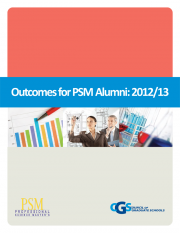You are on CGS' Legacy Site.
Thank you for visiting CGS! You are currently using CGS' legacy site, which is no longer supported. For up-to-date information, including publications purchasing and meeting information, please visit cgsnet.org.

Survey of recent alumni reveals strong income and employment results
Contact:
Julia Kent
jkent@cgs.nche.edu
(202) 223-3791
Washington, DC – Recent graduates of Professional Science Master’s (PSM) degree programs are reporting strong rates of employment and high income levels, according to the results of the third annual PSM Student Outcomes Survey released by the Council of Graduate Schools (CGS). The report tracks initial hiring trends and perceived satisfaction among graduates of PSM degree programs between 2010 and 2013. The study was supported with funding from the Sloan Foundation.
The PSM is an innovative graduate degree designed to allow students to pursue advanced training in science or mathematics, while simultaneously developing workplace skills highly valued by employers. PSM programs prepare graduates for careers in business, government, and non-profit organizations, combining rigorous study in science and/or mathematics with coursework in management, policy, law and related fields. Most PSM programs require a final project or team experience, as well as a “real-world” internship in a business or public sector enterprise.
According to the survey, 78 percent of respondents who graduated during the 2012-13 academic year were employed during the time at which the survey was conducted, despite beginning their careers in a challenging job market. The employment rate was even stronger for those who completed PSM degrees earlier in the study period: 91 percent of 2010-11 graduates and 88 percent of 2011-12 graduates were employed.
Among the respondents who graduated during the 2012-13 academic year and were employed at the time of the survey, 91 percent were working in a job that is closely or somewhat related to their field of study. Employed respondents were overwhelmingly working in full-time positions (95%) as opposed to part-time (5%).
Two-thirds (68%) of PSM graduates who were working full-time reported earning above $50,000 a year, and 72 percent of all survey respondents are very satisfied or generally satisfied with the post-graduation employment prospects provided by their PSM degree.
According to CGS President Debra W. Stewart, these high returns on students’ educational investment are a hallmark of PSM programs. “We continue to see outstanding prospects for new PSM graduates as they begin their careers. The real-world experience they gained in applied professional settings during their academic program gives PSM students a distinct advantage in the job market.” Dr. Stewart added, “The fact that PSM graduates have shown strong employment outcomes for each year of this three-year study is encouraging, because it shows that employers are consistently recognizing the value of these newly-minted degree holders.”
The survey report includes data on the reasons students enrolled in PSM programs, their experiences and satisfaction with them, their current employment status, salaries, and the perceived value of a PSM degree. Key findings include:
- 83% of 2012-13 PSM graduates were very satisfied or generally satisfied with the distinctive nature/reputation of the program and 82% were very satisfied or generally satisfied with the quality of their non-scientific and/or mathematical professional training (a key element of PSM degrees).
- Among 2012-13 PSM graduates who were employed, 66% were working in business/industry (including start-ups), about 11% were working in government, 9% in academia, 8% in non-profit organizations, and 6% were working in other fields, including research and health care.
- Among 2012-13 PSM graduates in new jobs, 19% secured that employment because of their PSM internship.
- Two attributes of PSM programs that stood out as being of particularly high value to recent graduates were the internships and ‘real world’ experiences, and the quality of scientific and/or mathematical training.
Created in 1997 with support from the Alfred P. Sloan Foundation, PSM programs are offered at 137 institutions of higher education, as of August 2013. Well over 5,000 PSM degrees have been conferred since the program’s inception. The PSM degree model has been so successful that it was included in the America COMPETES Act, allowing institutions the opportunity to use federal funds to support a PSM program.
The full report, Outcomes for PSM Alumni 2012/13, is available here. More information about the PSM can be found at http://sciencemasters.com.
The Council of Graduate Schools (CGS) is an organization of over 500 institutions of higher education in the United States and Canada engaged in graduate education, research, and the preparation of candidates for advanced degrees. Among U.S. institutions, CGS members award 92% of the doctoral degrees and 78% of the master’s degrees.* The organization’s mission is to improve and advance graduate education, which it accomplishes through advocacy in the federal policy arena, research, and the development and dissemination of best practices.
* Based on data from the 2012 CGS/GRE Survey of Graduate Enrollment and Degrees




